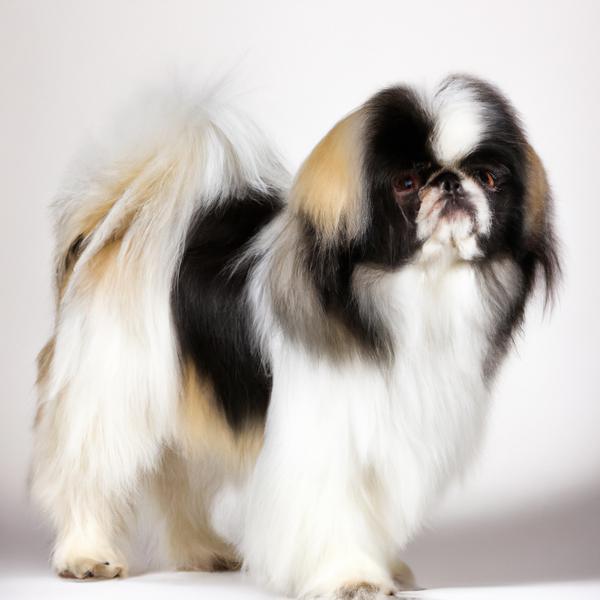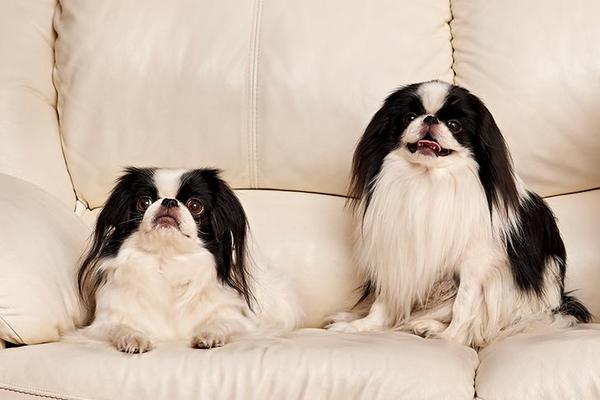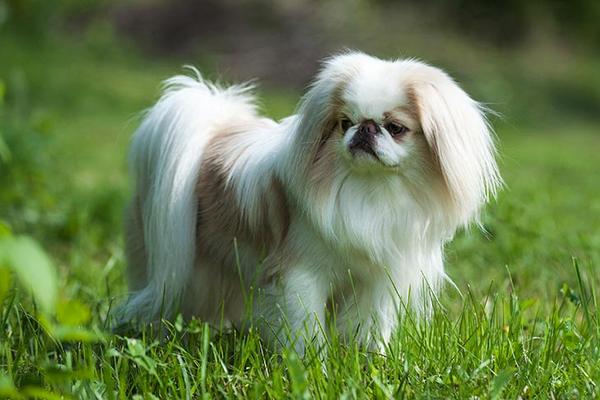Japanese Chin
also known as Japanese Spaniel, Chin

 History
History
The Japanese Chin, also known as the Japanese Spaniel, is a small and elegant breed of dog that is believed to have originated in China, but was later developed in Japan. The breed has a long and storied history that is intertwined with the history of Japan and its culture.
The origins of the Japanese Chin can be traced back to China, where it was known as the "Chinese Palace Dog." The breed was prized for its small size and delicate appearance, as well as its intelligence and loyalty. The Chinese Palace Dog was a popular companion among the Chinese imperial court, and was often given as gifts to foreign dignitaries.
In the 8th century, the Chinese Palace Dog was brought to Japan by Chinese traders and Buddhist monks. The breed was further developed and refined in Japan, where it was known as the "Japanese Chin." The breed was highly valued by the Japanese imperial court, and it was considered a status symbol among the nobility.
The breed's name, "Japanese Chin," is thought to have been derived from the fact that the breed was developed and refined in Japan. The name "Chin" is believed to be a corruption of the word "China," as the breed was originally from China.
Despite its long history and cultural significance in Japan, the Japanese Chin was almost extinct by the late 19th century, as a result of political and economic changes in Japan that led to a decline in interest in the breed. However, a group of dedicated breeders worked to preserve the breed, and it has since been re-established.
Today, the Japanese Chin is recognized by kennel clubs around the world, and it is considered to be a unique and valuable breed. The breed is known for its distinctive appearance, which includes a small and compact body, a long and silky coat that comes in a variety of colors, and a distinctive "pom-pom" tail. The breed is also known for its intelligence, loyalty, and affectionate nature, making it an excellent companion for families and individuals.
Breed Information
Is Japanese Chin a purebred?
Purebred
What were Japanese Chins originally used for?
lap dog
How Long Do Japanese Chins Live? What is average life expectancy for a Japanese Chin? How long can Japanese Chins live?
10-12 years
The average Japanese Chin lifespan is somewhere between 10-12 years, provided they aren't beset by any exceptional health issues or injuries.
Japanese Chin Height & Weight
How big is a full grown Japanese Chin?

| Height | ||||
|---|---|---|---|---|
| Average | 6 months | 12 months | 18 months | |
| Male | 8-11 inches (20.3 - 27.9 cm) | 7.0 inches (17.8 cm) | 8.0 inches (20.3 cm) | 9.5 inches (24.1 cm) |
| Female | 8-11 inches (20.3 - 27.9 cm) | 7.0 inches (17.8 cm) | 8.0 inches (20.3 cm) | 9.5 inches (24.1 cm) |
| Weight | ||||
|---|---|---|---|---|
| Average | 6 months | 12 months | 18 months | |
| Male | 4-7 pounds (2 - 3 kg) | 3.0 pounds (1 kg) | 4.0 pounds (2 kg) | 5.5 pounds (2 kg) |
| Female | 4-7 pounds (2 - 3 kg) | 3.0 pounds (1 kg) | 4.0 pounds (2 kg) | 5.5 pounds (2 kg) |
Do Japanese Chins get fat easily?
![]()
![]()
![]()
![]()
![]()
The Japanese Chin is a breed that has an average risk of becoming obese. Daily walks and a balanced diet of quality dry dog food can help maintain a healthy weight. An active lifestyle and monitoring weight regularly is recommended.
Are Japanese Chins Hypoallergenic?
No
Unfortunately, the Japanese Chin is not hypoallergenic, making it not a good choice for a dog lover who suffers from pet allergies.
What is a Japanese Chin personality? What are Japanese Chin dogs best known for?
Alert
Independent
Loving
Playful
Intelligent
Loyal
Are Japanese Chins heavy shedders? How Much Does a Japanese Chin Shed?
![]()
![]()
![]()
![]()
![]()
Japanese Chin dogs are not heavy shedders, but they will lose a significant amount of hair each year. To decrease the amount of shedding, you can regularly brush your Japanese Chin. This will remove loose hair and keep his coat growing in the same direction.
What is the watchdog ability of a Japanese Chin dog?
![]()
![]()
![]()
![]()
![]()
The Japanese Chin dogs are average watchdogs. If they sense something different, this breed will alert their owner.
Breed History
Where do Japanese Chins come from?
Japan
What are Japanese Chins descended from?
pug, pekingese
What organizations or kennel clubs recognize/register the Japanese Chin breed?
American Canine Registry
American Kennel Club
America's Pet Registry
Canadian Kennel Club
Dog Registry of America Inc.
Federation Cynologique Internationale
Kennel Club of Great Britain
North American Purebred Registry, Inc.
American Canine Association, Inc.
Australian National Kennel Council
Continental Kennel Club
National Kennel Club
New Zealand Kennel Club
When were Japanese Chins first bred? How old is the Japanese Chin breed?
ancient times
What Breed Group is a Japanese Chin?
Toy (AKC:1888)
Companion Dogs (UKC)

Japanese Chin Appearance
What color are Japanese Chin eyes?
Brown
What color can Japanese Chin nose be naturally?
Black
What color can Japanese Chin coat be naturally?
Black
Red
Cream
Fawn
White
Pied
Sable
Brindle
How long is a Japanese Chins coat?
![]()
![]()
![]()
![]()
![]()
The coat of a Japanese Chin is longer than that of the typical dog.
How Dense Is The Japanese Chin Coat?
![]()
![]()
![]()
![]()
![]()
What is the texture of the hair of a Japanese Chin?
Straight
How many puppies can a Japanese Chin have in a litter? How many puppies can a Japanese Chin have in her first litter?
10-12 puppies per pregnancy
A Japanese Chin can have a litter of 10-12 puppies on average. However, it's worth noting that the size of the litters can vary greatly. Factors that can influence litter size include the health of the mother, breeding history, and genetics.
![]()
![]()
![]()
![]()
![]()
Japanese Chins are known for their adaptability and versatility, they are capable of adapting well to a wide range of lifestyle changes and living environments. They are a highly adaptable breed, and make great companions for families and individuals of all lifestyles.

Japanese Chin Health Issues
Do Japanese Chins have a lot of health problems?
![]()
![]()
![]()
![]()
![]()
The Japanese Chin is generally considered to be healthy. However, like all breeds, they are susceptible to certain health issues and it is important to keep an eye out for them and address them with your veterinarian as needed.
What are the major health concerns to be aware of when owning a Japanese Chin?
Usually A Very Healthy Breed
What are the less significant issues to keep in mind when it comes to Japanese Chins?
Patellar Luxation
Cataracts
Legg-Calve-Perthes Disease
Heart Murmur
What are the occasional tests recommended for Japanese Chin breed?
Eye
Knee
Heart
Skeletal
X-Rays
Eye Examination

Japanese Chin Needs and Activities
Do Japanese Chins have a lot of energy?
![]()
![]()
![]()
![]()
![]()
Japanese Chins may be a good breed for those who prefer a more relaxed lifestyle. They tend to have a lower energy level than other breeds of dogs.
Do Japanese Chins need socialization? How social are Japanese Chins?
![]()
![]()
![]()
![]()
![]()
Japanese Chin have very high social needs. These needs include regular mental and physical stimulation, a job or purpose, and companionship. They thrive in environments where they have a lot of interaction with humans and other dogs.
How much exercise should Japanese Chins get?
![]()
![]()
![]()
![]()
![]()
The Japanese Chin is a breed that requires minimal physical activity to maintain a healthy lifestyle.
How much sleep should a Japanese Chin have? Do Japanese Chins sleep a lot?
![]()
![]()
![]()
![]()
![]()
The Japanese Chin breed is known for their relaxed and calm nature and tendency to sleep for long periods of time.
Does a Japanese Chin drool a lot?
![]()
![]()
![]()
![]()
![]()
The Japanese Chin is a breed of dog that is characterized by its minimal drooling, making it an ideal choice for people who dislike drool marks on their clothing.
How much does it bark?
![]()
![]()
![]()
![]()
![]()
Japanese Chins are known to bark very little or not at all. They tend to be very quiet and do not bark excessively. They may only bark in specific situations, such as when they need to alert their owner to something important or when they are in distress.
Do Japanese Chins exhibit aggressive behavior to safeguard their home and territory? Do they possess a natural tendency to guard?
![]()
![]()
![]()
![]()
![]()
These dogs are known for their strong territorial instinct and protective nature. They will fiercely defend their territory and are highly alert and vigilant against any perceived threat to their home and family.
Are Japanese Chins mouthy?
![]()
![]()
![]()
![]()
![]()
What is the likelihood of a Japanese Chin running away? Do they have a tendency to explore or wander frequently?
![]()
![]()
![]()
![]()
![]()
Do Japanese Chin dogs have a high prey drive?
![]()
![]()
![]()
![]()
![]()
What do Japanese Chins enjoy doing? How do I keep my Japanese Chin busy?
Sniffing, Pets, Walk
What is the energy level of a Japanese Chin? How much energy does a Japanese Chin have?
Low
Japanese Chins are low-energy dogs. This breed make a great companion for a relatively inactive person. Japanese Chin dogs require a few short daily walks, and then they're happy snuggling next to you for the rest of the day.
![]()
![]()
![]()
![]()
![]()
How far should a Japanese Chin walk each week? How many miles should a Japanese Chin walk every week?
4 miles / week
There's really no limit to how far you walk your dog as long as they're comfortable. For Japanese Chin, it's at least 4 miles / week. Just remember to build distance and stamina gradually over time.
How much a Japanese Chin should exercise a day? How much activity does a Japanese Chin need?
30 minutes
In general most Japanese Chins usually need at least 30 minutes of exercise daily. This can be spread across the day and include all sorts of high-energy activities, like walking, running and playing.
What level of grooming should be provided for a Japanese Chin?
![]()
![]()
![]()
![]()
![]()
The Japanese Chin is a breed of dog that requires an average amount of grooming effort.
How often should you brush a Japanese Chin?
Weekly
Japanese Chin should be brushed at least once a week. Of course you can give them more frequent brushes if you find that they are still shedding a lot
What are the most commonly used brushing tools for Japanese Chins?
Pin Brush
Slicker Brush
Nail Clipper
Costs
How many cups of food does a Japanese Chin eat?
1 cups
For an average 4-7 pound (2 - 3 kg) Japanese Chin feed 1 cups daily. But, keep in mind, the amount you feed is going to be dependent on the quality of the food you are feeding.
How Much Does a Japanese Chin Cost Daily?
$1.10 - $1.40 / day
The average cost of a Japanese Chin is somewhere $1.10 - $1.40 per day.
How Much Does a Japanese Chin Cost Per Month?
$28 - $42 / month
The average per month expenses of a Japanese Chin is between $28 - $42. This makes an average of $336 - $504 per year. It will be on the higher side when the dog is still small because it will need more frequent visits to the vet, shots.
Japanese Chin Characteristic
How intelligent is a Japanese Chin?
![]()
![]()
![]()
![]()
![]()
The Japanese Chin have below the average degree of obedience intelligence among other breeds. However, calling them “dumb dogs” is unfair. Where Japanese Chins lack in obedience & working intelligence, they make up for it with their keen ability to understand human emotions.
How sensitive is a Japanese Chin dog?
![]()
![]()
![]()
![]()
![]()
Japanese Chin dogs have average emotions and are adaptable to different situations, not requiring extra care like sensitive breeds do.
Are Japanese Chin dogs affectionate?
![]()
![]()
![]()
![]()
![]()
Do Japanese Chin do well in apartments? Are Japanese Chins good indoor dogs?
![]()
![]()
![]()
![]()
![]()
Japanese Chins are known for being excellent apartment dogs. They are fairly active indoors and will do okay without a yard.
Are Japanese Chins good with kids? Are Japanese Chins good around children?
![]()
![]()
![]()
![]()
![]()
Japanese Chins are not the most kid-friendly dogs. If you have children, you might want to reconsider adopting another dog as a companion.
Are Japanese Chins good for elderly?
![]()
![]()
![]()
![]()
![]()
Are Japanese Chins good with cats? How friendly Japanese Chins are toward cats?
![]()
![]()
![]()
![]()
![]()
Japanese Chins are very cat friendly dogs. They generally make good companions for cats.
Do Japanese Chin dogs get along with other dogs? Are Japanese Chins OK with other dogs?
![]()
![]()
![]()
![]()
![]()
Japanese Chins are average friendly towards other dogs. If they are raised with other dogs, they are likely to get along with them. And, if they are socialized properly from a young age, they will usually be great with other dogs.
How do Japanese Chin dogs interact with other pets? Are they considered pet-friendly?
![]()
![]()
![]()
![]()
![]()
Are Japanese Chins friendly with strangers?
![]()
![]()
![]()
![]()
![]()
Japanese Chins are very friendly around strangers.
Do Japanese Chins like to play? Are Japanese Chins playful?
![]()
![]()
![]()
![]()
![]()
Japanese Chins have an average level of playfulness. The Japanese Chins, like other dogs, like to play. But they are not the most playful dog breed.
Are Japanese Chin easily trained?
![]()
![]()
![]()
![]()
![]()
Japanese Chin dogs are usually easy to train, but may require consistency to fully obey commands.
 Pros & Cons
Pros & Cons
Pros
- Quiet
This breed is known for being relatively peaceful, making it a good choice if you're looking for a quieter dog. - Small size
Suitable for small homes or apartments - Good with children and other pets
Making them a great family pet - Cat Friendly
Japanese Chins and cats tend to be a suitable pairing. - Affectionate
Loyal towards their owners, making them great companion dogs - Intelligent
Easy to train, suitable for obedience and agility training
Cons
- Not suitable for office environment
Japanese Chins may struggle to adapt to an office environment. - Not Hypoallergenic
The non-hypoallergenic nature of Japanese Chins can lead to allergic reactions in people prone to allergies.
Compare Japanese Chin with other dogs
- Japanese Chin vs Irish Wolfhound
- Japanese Chin vs Corswiss
- Japanese Chin vs Bluetick Rat Terrier
- Japanese Chin vs Silky Coton
- Japanese Chin vs Highland Maltie
- Japanese Chin vs Afghan Retriever
- Japanese Chin vs Minnie Jack
- Japanese Chin vs Curly Coated Retriever
- Japanese Chin vs Siberian Cocker
- Japanese Chin vs Glen of Imaal Terrier